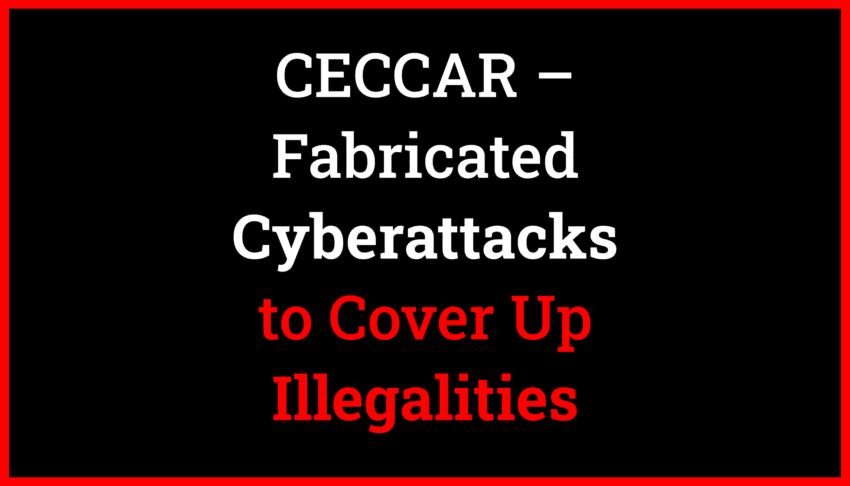The Romanian Body of Expert and Licensed Accountants (CECCAR) has recently disseminated a story across its websites, social media channels, and paid media (often concealing the source of funds—the professional body itself) regarding alleged „complex cyberattacks.” However, those familiar with the operational methods of the leadership, specifically under Robert Aurelian Șova, for dissimulating critical situations, recognize the information being „served” to the public as false. This controversy is rooted in an internal, institutional struggle triggered by the Șova-Chivu governance itself, following multiple, deliberate illegalities.
The Official Narrative: DNSC Warning or CECCAR Spin?
The official statement on CECCAR’s website claims the National Cyber Security Directorate (DNSC) is warning of „complex cyberattacks targeting CECCAR, with the aim of damaging the organization’s image and compromising the Congress of the accounting profession.”
The statement alleges that attackers illegally stole and used a LinkedIn account associated with CECCAR to send spam to international partners and guests, and that attempts were made to promote fake websites mimicking legitimate sources to compromise the image of the organization and the event.
However, a consultation of the DNSC’s public Facebook page reveals the DNSC post merely mentions: „Following reports received, attackers illegally stole and used a LinkedIn account associated with CECCAR, through which spam messages are being sent… Attempts to promote fake websites have also been identified…”
Conclusion: CECCAR seemingly lodged an unsubstantiated report with the DNSC, but then proceeded to inform the public, attempting to falsely imply that the DNSC was certifying the entire complaint as factual.
The Whistleblowers’ Case: Why is CECCAR’s claim unfounded?
Romania’s Emergency Ordinance No. 104/2021 clearly defines a cyber threat as an action that could cause damage or disruption to networks and IT systems.
Whistleblowers, protected by Law No. 361/2022, have raised alarms regarding major, persistent deviations from the law by central leadership factors. These whistleblowers did not disrupt systems, defame the professional body, or seek to compromise the Congress. They merely drew attention and posed questions deemed inconvenient.
Where is the complex cyberattack?
- The websites used by whistleblowers to expose the immoral or illegal activities of CECCAR leaders do not mimic or have similar interfaces to the official CECCAR site. They are legitimate communication channels for exposing illegalities concerning CECCAR’s management.
- All whistleblowers’ revelations target an organized group within CECCAR’s leadership, not the institution, the profession, or the Congress. The institution and the profession are protected by special laws and cannot be compromised by the actions of a few individuals.
- The referenced LinkedIn account does not belong to CECCAR and was thus neither stolen nor illegally used. This is a clear testament to the chaos and mismanagement characterizing the leadership.
The tendentious manner in which information regarding the whistleblowers’ activities was communicated to the DNSC once again confirms the lack of morality and maturity of the leadership under scrutiny.
Direct Questions for the Leadership
If these „incidents” have legal basis, we invite all those who consider themselves the targeted leadership—via the Robert Aurelian Șova governance, continued in the same tone of illegality and immorality by the Șova-Chivu governance—to answer the following:
- What internal measures did you take to prevent the „gravity of the situation” and avoid „digital manipulation attempts” that „endanger trust in fundamental institutions of society?” Or do you believe your only role is to collect generous indemnities, live rent-free in apartments purchased with members’ funds, and file external complaints, seeking scapegoats for your own failures and incompetence masked by illegality and manipulation? We will reveal EVERYTHING.
- How exactly are we „compromising” the Congress? What frightens you? Could it be the disclosure of the „supply chain secrets” to the members? Then, make the detailed Congress budget public! Members will draw their own conclusions.
A Call for Accountability and Integrity
CECCAR states that „The accounting profession has an essential mission for the economy and society… Cyberattacks will not be able to undermine either the trust or the professionalism that CECCAR defends daily.” True! Because there is no „cyberattack” coming from the whistleblowers! CECCAR defends trust and professionalism through its organizing laws. Why do you, the accused and exposed CECCAR leadership, not respect these laws and the fundamental rights of expert and licensed accountants?
- What objective state of affairs, independent of your actions, endangers the public interest and the prerogatives conferred upon CECCAR by law? Are you not, the CECCAR leadership, the ones who fail to respect the body’s fundamental organizing laws?
- Are whistleblowers „cyber attackers” because they have the courage and dignity to publicly expose your misconduct? Explain your misconduct; stop fabricating stories!
In your deceitful communications, you state: „CECCAR emphasizes the gravity of the situation, showing that these attempts at digital manipulation endanger trust in fundamental institutions of society.” Of course! The situation is indeed grave due to the group immorality and illegalities of the CECCAR leadership! Your actions and deeds endanger the institution because you refuse to respect its own rules of organization and operation for your personal gain. Stop inventing cyberattacks carried out by whistleblowers; respond professionally to our reports! Public interest is not your group interest. Renounce the cultivation of confusion through manipulation!
We will not be intimidated! Our endeavor will continue! We are not criminals; we are whistleblowers protected by law for our courage to expose your immorality and abuses!
A Romanian version of this article is available here:
https://www.ceccar.net/2025/09/ceccar-atacuri-cibernetice-inventate.html
